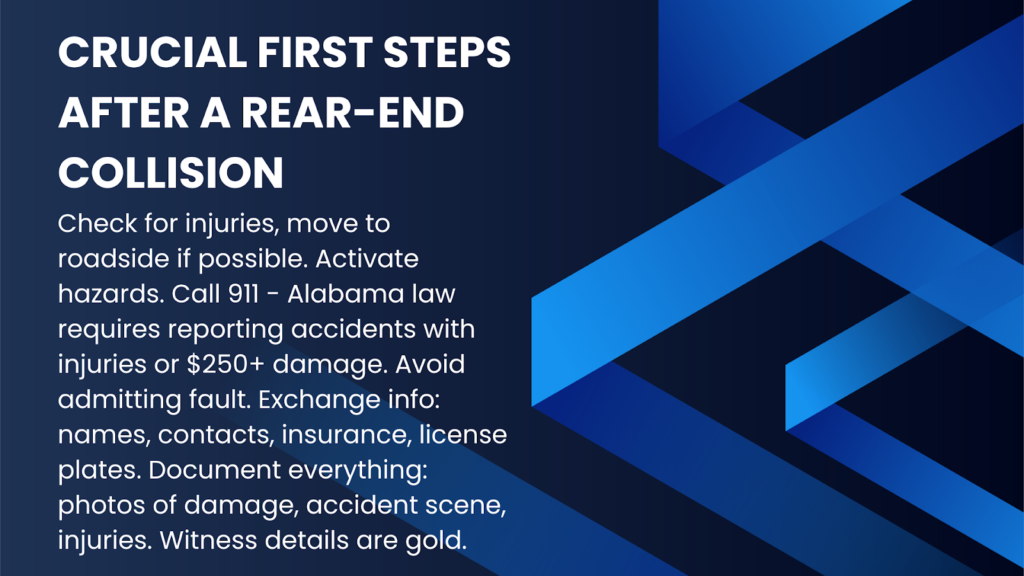
Whether you’re stuck in rush hour traffic on I-65 or navigating the busy streets of Birmingham, the risk of a rear-end collision is ever-present.
But what should you do if you find yourself in this situation?
Here, our Alabama car accident attorneys will explore the steps to take after a rear-end collision in Alabama to ensure your safety, protect your rights, and navigate the often complex aftermath of such an incident.
Understanding Rear-End Collisions in Alabama
Rear-end collisions occur when one vehicle strikes the back of another. While often considered less severe than other types of accidents, they can still result in significant injuries and property damage.
In Alabama, these accidents are particularly common due to:
- Heavy traffic in urban areas like Birmingham and Montgomery;
- Distracted driving, especially texting while driving;
- Sudden stops on highways and interstates; and
- Poor weather conditions, including frequent rain and occasional ice.
Understanding the unique factors contributing to rear-end collisions in Alabama helps you stay alert and avoid becoming a statistic.
However, knowing the proper steps to take is crucial if you do find yourself involved in such an accident.
Immediate Actions to Take After a Rear-End Collision
The moments immediately following a rear-end collision can be chaotic and stressful. However, taking the right actions can significantly impact your safety and any potential legal or insurance claims.
Here’s what you should do:
- Check for Injuries: Your health and safety should be your top priority. Check yourself and your passengers for any injuries, no matter how minor they may seem.
- Move to Safety: If possible, move your vehicle to the side of the road to avoid further accidents. Turn on your hazard lights to alert other drivers.
- Call 911: Even if the accident seems minor, it’s crucial to have a police report. In Alabama, you’re required by law to report any accident that results in injury, death, or property damage exceeding $250.
- Don’t Admit Fault: Be careful about what you say at the scene. Even a simple “I’m sorry” could be interpreted as an admission of fault.
- Exchange Information: Get the other driver’s name, contact information, insurance details, and license plate number. If there are witnesses, try to get their contact information as well.
- Document the Scene: Take photos of the damage to all vehicles involved, the overall accident scene, and any visible injuries. These can be crucial for insurance claims and potential legal proceedings.
Remember, your actions in these first few moments can significantly impact what follows. Stay calm, prioritize safety, and focus on gathering the information you’ll need moving forward.

Seeking Medical Attention After a Rear-End Collision
One of the most critical steps after any car accident, including rear-end collisions, is seeking medical attention.
This is important for several reasons:
- Some injuries, particularly those associated with rear-end collisions like whiplash, may not be immediately apparent.
- Prompt medical attention can prevent minor injuries from becoming more serious.
- Medical records serve as crucial evidence if you need to file an insurance claim or lawsuit.
In Alabama, you have several options for seeking medical care after an accident:
- Emergency Room: For serious injuries, head to the nearest emergency room. Hospitals like UAB Hospital in Birmingham or Baptist Medical Center South in Montgomery are equipped to handle accident-related injuries.
- Urgent Care Centers: For less severe injuries, urgent care centers can provide prompt treatment without the long wait times of an ER.
- Primary Care Physician: If your injuries are minor, you might choose to see your regular doctor. However, make sure to inform them that you’ve been in a car accident.
Remember, even if you feel fine, it’s still a good idea to get checked out. Some injuries, particularly soft tissue injuries common in rear-end collisions, may not manifest symptoms for hours or even days after the accident.
Reporting the Accident to Your Insurance Company
After ensuring your immediate health and safety, the next crucial step is to report the accident to your insurance company.
Here’s what you need to know about this process:
- Timing is Crucial: Report the accident as soon as possible. Many insurance policies require prompt reporting, and delays could potentially affect your claim.
- Provide Accurate Information: Give your insurance company a clear, factual account of what happened. Stick to the facts and avoid speculating about fault or the extent of injuries or damages.
- Understand Your Coverage: Familiarize yourself with your insurance policy. In Alabama, drivers are required to have minimum liability coverage, but you may have additional coverage that could be relevant in a rear-end collision.
- Keep Detailed Records: Document all communications with your insurance company. This includes the date and time of calls, the name of the person you spoke with, and what was discussed.
- Be Cautious About Early Settlement Offers: Insurance companies may try to settle quickly, but early offers may not account for the full extent of your damages or injuries.
Remember, while your insurance company is there to help, they also have their own interests to protect.
It’s often wise to consult with a legal professional before accepting any settlement offers, especially if you’ve sustained significant injuries or property damage.
Gathering and Preserving Evidence After a Rear-End Collision
In the aftermath of a rear-end collision, the evidence you gather can make a significant difference in any insurance claims or legal proceedings.
Here’s how to effectively collect and preserve crucial evidence:
- Photographs: Take extensive photos of damage to all vehicles involved; the overall accident scene, including skid marks and road conditions; any visible injuries; and traffic signs or signals in the area.
- Witness Statements: If there were any witnesses to the accident, try to get their contact information and a brief statement about what they saw.
- Police Report: Obtain a copy of the police report. This official document can provide an unbiased account of the accident.
- Medical Records: Keep detailed records of all medical treatments, including diagnoses, prescriptions, and bills.
- Personal Account: As soon as possible after the accident, write down your recollection of events while they’re fresh in your mind.
- Vehicle Damage Assessment: Get a professional assessment of your vehicle’s damage. This can help establish the severity of the impact.
- Lost Wages Documentation: If you’ve had to miss work due to injuries from the accident, keep records of your lost wages.
Remember, having strong evidence is particularly important in Alabama’s contributory negligence system. The more thorough your documentation, the better positioned you’ll be to protect your rights and interests.
Dealing With Insurance Adjusters After a Rear-End Collision
After reporting your accident, you’ll likely be contacted by an insurance adjuster. While they may seem friendly, it’s important to remember that their job is to minimize the insurance company’s payout.
Here are some tips for dealing with insurance adjusters:
- Be Polite but Cautious: Maintain a cordial demeanor, but be careful about what you say. Anything you tell the adjuster could potentially be used to reduce or deny your claim.
- Stick to the Facts: Provide basic information about when and where the accident occurred, but avoid giving detailed statements about fault or injuries until you’ve consulted with a lawyer.
- Don’t Accept the First Offer: Initial settlement offers are often lower than what you may be entitled to. Don’t feel pressured to accept immediately.
- Document All Communications: Keep a record of all interactions with the insurance company, including dates, times, and the content of conversations.
- Be Wary of Requests for Recorded Statements: You’re not obligated to provide a recorded statement. It’s often wise to consult with a lawyer before doing so.
- Understand the Full Extent of Your Damages: Don’t settle until you have a clear understanding of all your injuries and damages. Some injuries may not be immediately apparent.
- Consider Legal Representation: If you’re dealing with significant injuries or complex liability issues, it may be beneficial to have a lawyer communicate with the insurance company on your behalf.
Remember, insurance adjusters are professionals at negotiating settlements. Having your own advocate can help ensure you receive fair compensation for your injuries and damages.
Navigating the Aftermath of a Rear-End Collision in Alabama
Rear-end collisions, while common, can have serious consequences. From the moment of impact to the final resolution of your case, the steps you take can significantly influence the outcome.
Remember these key points:
- Prioritize safety and seek medical attention immediately after the accident.
- Document everything, from the accident scene to your medical treatments.
- Understand Alabama’s contributory negligence laws and how they might affect your case.
- Be cautious when dealing with insurance companies and consider legal representation if needed.
- Take proactive steps to prevent future rear-end collisions.
Remember, each accident is unique, and while this guide provides general information, it’s always best to consult with a qualified professional for advice tailored to your specific situation.
Stay safe on Alabama’s roads, and if you find yourself involved in a rear-end collision, know that you have resources and support available to help you through the process.
Our experienced team of attorneys specializes in car accident cases, including rear-end collisions, and we have a deep understanding of Alabama’s unique laws and regulations.
Can't find what you're looking for? Search our site below.










